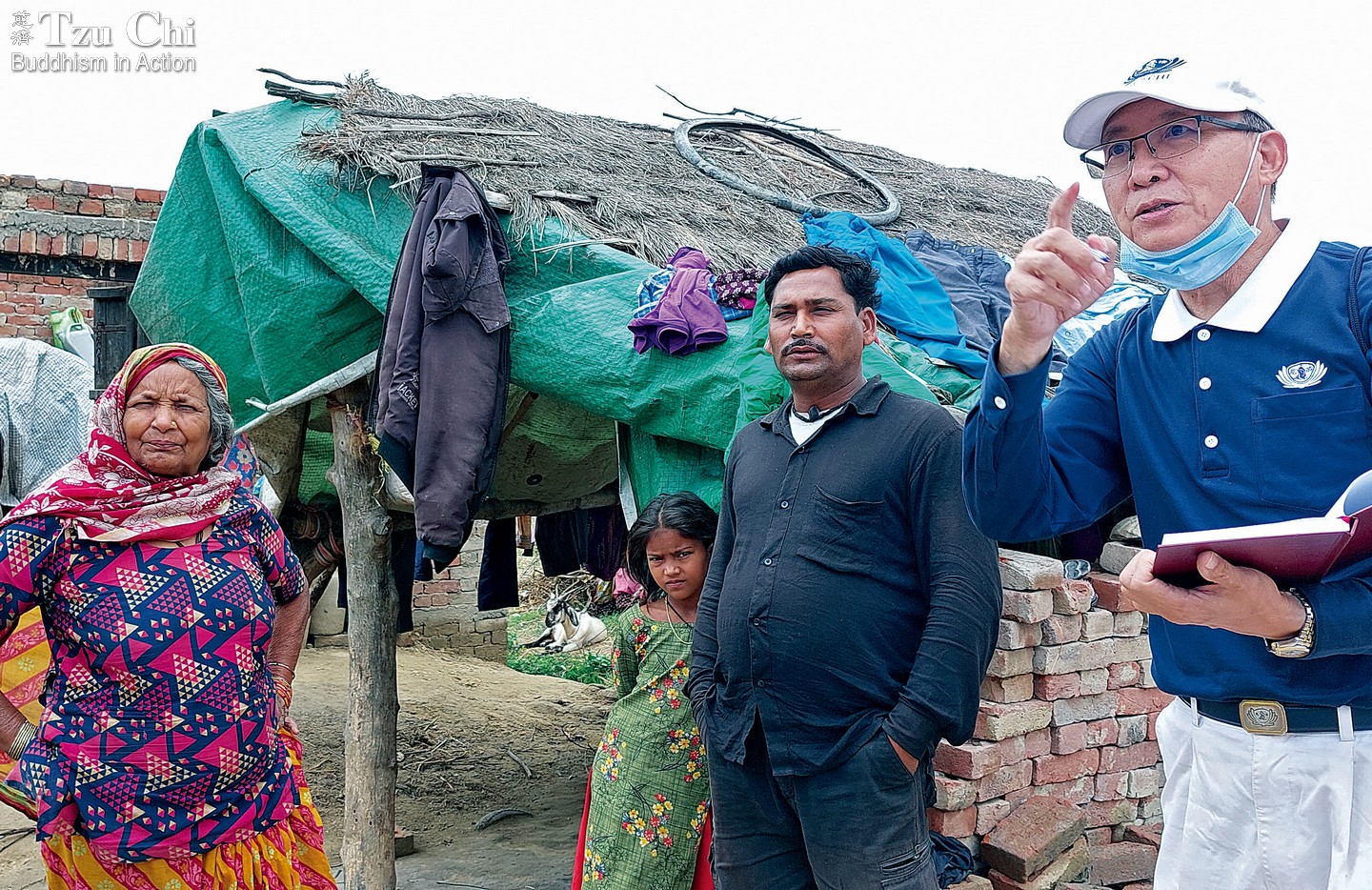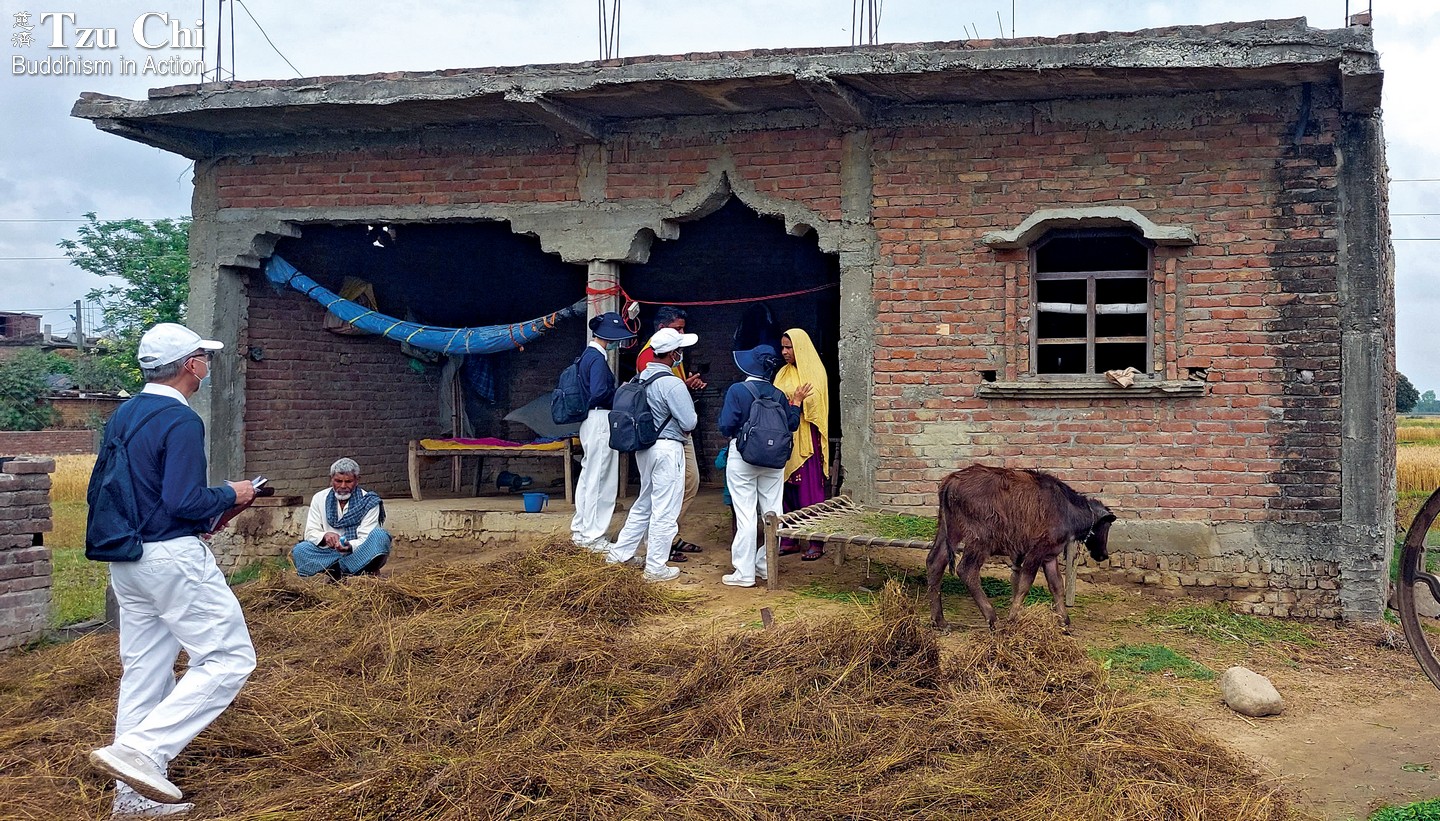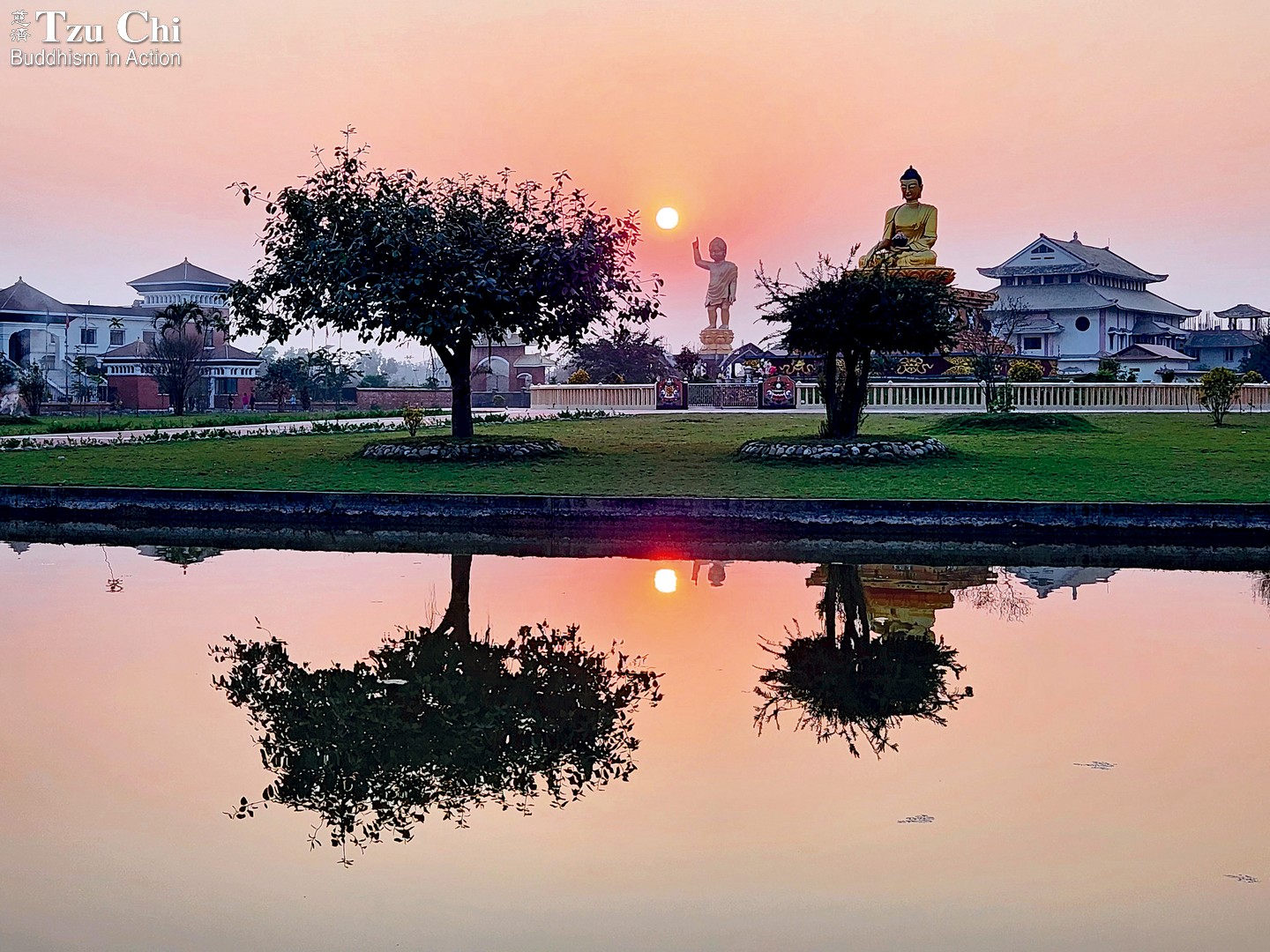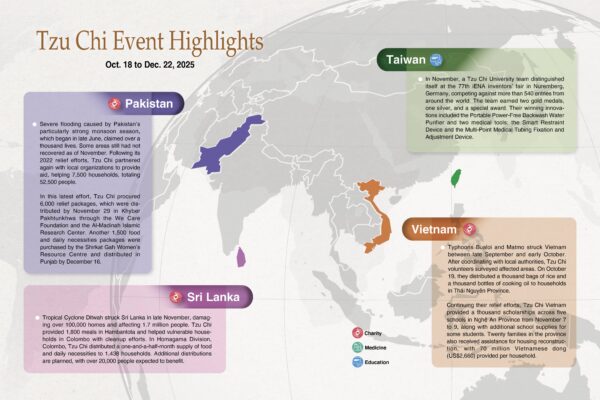By Goh Lam Kia
Translated by Wu Hsiao-ting
Photos by Li Guo Xiang
Knowing that Dharma Master Cheng Yen has unfulfilled wishes, I understand that it’s my responsibility as a disciple to help fulfill them. I haven’t accomplished anything significant in my life, so I’m determined to seize this opportunity and make a meaningful impact.

Singaporean Tzu Chi volunteer Goh Lam Kia (吳南凱, far right), stationed in Nepal on a long-term basis, appreciates the opportunity to serve in the country and make meaningful contributions.
I’m a member of a Tzu Chi volunteer team from Singapore and Malaysia, stationed on a long-term basis in Lumbini, Nepal. To be honest, I never anticipated finding myself in Lumbini for such an extended stay. The shift from the fast-paced, efficiency-driven lifestyle of highly-developed Singapore to the unhurried and tranquil pace of Nepal has been a wholly novel experience. From daily surroundings to dietary customs, everything requires a thorough adjustment.
There is a Chinese saying that says, “If the mountain doesn’t yield, attempt a detour; if the path remains unpassable, adapt your course.” Often, changing our surroundings and the people we come into contact with proves challenging. However, when we initiate change in ourselves, everything else begins to fall into place.
Coming from Singapore and Malaysia, we sometimes approach situations and handle matters here in Nepal based on our experiences from our home countries. This can lead to feelings of frustration and complaints when things don’t align with our expectations. To avoid such feelings of frustration, we must make a sincere effort to see things from the perspective of the local people.
Nepal is a landlocked nation without ports, which presents transportation challenges. Capitalists don’t usually come here to invest. The general population is not highly educated, which hampers technological progress, but they are kind-hearted and unassuming. Most people are involved in farming.
Driving on the roads, you don’t have to deal with “road bullies” but “cow bullies”—cows occupy the roads. In such situations, all you can do is slow down, honk the horn, and patiently wait for the cows to leisurely make way for you to pass.
During home visits, we have to bend down to enter the people’s low thatched houses. These modest dwellings have openings on all sides, and leak when it rains. People and animals share the same rooms, and the floors are coated with cow dung. Observing this, I couldn’t help but reflect that the impoverished way of life appears to have remained largely unchanged since the time of the Buddha, approximately 2,500 years ago.
Five prerequisites
How did I end up in Lumbini? It all started during a weekend in May 2022, when Tzu Chi Singapore’s CEO, Low Swee Seh (劉瑞士), arranged a meeting with Deputy CEO Khoo Kean Yee (邱建義) and me. During that meeting, he shared with us Dharma Master Cheng Yen’s deep desire to give back to the birthplace of the Buddha, uplift those in need there, and shine a light on the teachings of Buddhism at its very source. (Though the Buddha was born in Lumbini, less than ten percent of Nepalese are Buddhist. Hinduism is the predominant religion, followed by more than 80 percent of Nepalese.) Our CEO inquired if we were willing to contribute time and effort in Lumbini.
My immediate reaction to our CEO’s inquiry was that this was a once-in-a-lifetime chance. Recognizing that the Master had unfulfilled aspirations, I saw it as my responsibility as her disciple to fulfill her wishes and carry out her vision. I hadn’t accomplished anything significant in my life. With this remarkable opportunity to serve now before me, I decided I had to seize it to make a meaningful impact.
Since I arrived in Lumbini last July, I’ve come to realize that not everyone could have joined this mission as enthusiastically as I did. There are five conditions that must be met to enable you to serve here:
- You need to have time: It’s challenging for those with work or family obligations to take extended breaks.
- You need to have extra money: Tzu Chi volunteers finance their own trips for all missions, including international disaster relief, aid distribution, and medical assistance.
- You need to be in good health: You must be able to endure temperatures of 38 to 40 degrees Celsius (100-104°F) or even higher, and also be able to cope with cold winter weather.
- You need your family’s blessings: Even if you meet all the other requirements, staying might not be feasible without your family’s support.
- You need strong determination: It’s crucial to make a sincere commitment to aiding suffering beings.
The arrival of the Buddha in this world over 2,500 years ago marked a significant moment. His mission was to illuminate the truths of life. I sometimes wonder, did he have any regrets before attaining nirvana? When he left behind his royal life to embark on his spiritual journey, it was to discover the path of liberation, alleviate the suffering of all sentient beings, and guide them toward enlightenment. Yet, today, more than 2,500 years later, an abundance of suffering still persists, encompassing not only physical afflictions but also inner spiritual unrest.
Similarly, the arrival of Dharma Master Cheng Yen in this world 86 years ago marked a momentous occasion. She teaches and guides everyone to walk the Bodhisattva Path and perform acts of benevolence for the benefit of humanity. She was an unknown Buddhist nun in 1966 when she founded Tzu Chi in Hualien, Taiwan. Now, the footprints of our humanitarian missions have reached 128 countries and areas. It’s evident that the Master is fulfilling the unfulfilled aspirations of the Buddha.
Our own arrivals in this world also hold great significance. It was a remarkable confluence of circumstances that allowed us to attain a human existence, join Tzu Chi, walk the Bodhisattva Path, disseminate the Buddha’s teachings, and even bring the teachings back to the very birthplace of the Buddha. As disciples of the Enlightened One, our mission is to spread his teachings and foster the well-being of all sentient beings.

Volunteers use Lumbini as their operational base and conduct visits to the nearby rural areas in Kapilvastu. The households there exhibit a range of living conditions—some richer, others poorer. Many families have brick houses, albeit sparsely furnished.
Grateful for being born in Singapore
Lumbini, located 250 kilometers (155 miles) from the capital city of Kathmandu, lies at the border of Nepal and India. The Maya Devi Temple in the local Lumbini Garden marks the place where the Buddha was born. It attracts many devotees and tourists.
I often stroll near the temple in the serene hours of dawn and dusk to nurture inner peace. My life in Singapore was usually fast-paced, leaving little time for my mind to settle. But here in Lumbini, my days are dedicated solely to Tzu Chi work, allowing me more time for introspection.
My duties in Lumbini include recording our work here. As a documenting volunteer, I often need to participate in and witness events firsthand, recording touching stories, capturing video footage, and creating news content to share with a wider audience. I keep a daily work journal too, chronicling the footsteps of our volunteers in Lumbini. Each day here unfolds with its own heartwarming stories worth documenting.
For example, there was a woman who begged near the Maya Devi Temple every day. I often crossed paths with her on my walks and would offer greetings. Later, one of the woman’s neighbors informed us that she really needed help. A team of us paid her a visit and discovered that she had a congenital disability in her left forearm. Her husband and older son had passed away a few years earlier, leaving her and her younger son to fend for themselves. Unfortunately, the younger son was burdened with a congenital heart condition, and they lacked the means to afford his medical treatment. Despite the best efforts of neighbors to help, they couldn’t come up with enough money to have him treated at a major hospital.
As she shared her heart-wrenching story with us, the beggar woman became emotional and burst out crying. We noticed that her rice container was empty, so we quickly bought rice and other food for her. Our assistance moved her to tears, prompting our volunteers to offer comforting hugs. She seemed to sense our genuine care, and a glimmer of hope appeared in her eyes. Afterwards, we coordinated with our medical team to provide further assistance and support.
Serving in Nepal, my fellow volunteers and I are often deeply touched by our experiences here. Those of us from Singapore have also come to appreciate the privilege of being born in our home country, where the government takes care of every citizen. This stands in contrast to many impoverished regions around the world, where resources are scarce, and assistance is often out of reach.
Count your blessings and sow more
Another touching event took place at a government primary school. Last December, during the harsh winter, Tzu Chi initiated distributions to help students in over 20 schools. Our volunteers, bundled up in thick jackets against the cold, noticed a young girl at one school shivering uncontrollably. Approaching her, they touched her hands and were surprised to find that her clothes were wet. They immediately provided her with warm winter clothes, one of the items to be distributed, and held her close to share their warmth.
Our volunteers discovered the girl’s challenging circumstances the next day, during a home visit. Her parents had passed away, so she was being raised by her grandparents. But because her grandparents were quite elderly, she had taken on all household responsibilities at the tender age of 12. Our volunteers felt great sympathy for the girl.
The young girl explained that the school principal had announced that an organization would be visiting the school to distribute gifts, and he instructed all students to wear their school uniforms. She had only one uniform, which had been washed but hadn’t dried in time. Consequently, she had no choice but to don the damp uniform and go to school, enduring the chilly, gusty winds. Initially puzzled about why her mother had dressed her in wet clothes, our volunteers now felt deep remorse for their earlier assumptions. A few days later, on an early morning, they delivered food to her home before school and brought gloves for her and her grandmother.
The volunteers couldn’t help but express their heartache at her situation. Children in Nepal experience vastly different circumstances compared to those in more affluent nations. For example, in Singapore and Malaysia, children as young as this girl are cherished and showered with love by their parents. But here, they begin assisting their mothers from a very young age. We’ve learned of a family where, only three days after giving birth, a mother returned to the fields to harvest wheat, leaving her three-day-old infant in the care of older siblings at home. Shouldn’t those of us born into more fortunate circumstances learn to count our blessings and sow more?

The Lumbini Garden complex, spanning nearly eight square kilometers (three square miles), is intersected by a canal. Within this expansive area stand temples built by various countries. Prince Siddhartha, who would later become the Buddha, was born here over 2,500 years ago. Beyond the garden area, traditional village life unfolds in a different scene.
Tang Kiat Beng
From one comes infinity
Every day, our team of volunteers from Malaysia and Singapore, along with local volunteers, split up to conduct home visits, distribute aid, and discuss collaborations with government and local authorities. Obviously, a single documenting volunteer cannot cover all our activities, necessitating mutual support among team members. Those of us responsible for documenting our philanthropic efforts take photos, write reports, and share them on an online platform, from which we compile news. We also send daily journals back to Tzu Chi headquarters in Taiwan, complete with both text and photos.
Being a documenting volunteer comes with its own pressure. We accompany our team on visits during the day, often extending into late afternoon. As a result, we often can’t begin writing our journals until after dinner. At times, physical and mental exhaustion make it a challenge to articulate our experiences. On other occasions, we need time for introspection and reflection before we can begin writing.
Despite these challenges, we find fulfillment in serving as the hands, feet, eyes, and ears of Master Cheng Yen on the front lines. We report what we see, hear, and do, seeking her guidance for our work. Currently, in Lumbini, Tzu Chi has constructed a new building for a local free clinic center and initiated vocational training classes. Our School for All initiative has expanded to encompass 23 schools, and the number of locally trained volunteers has surpassed a hundred.
As we pass by the Lumbini Garden every day, we see a flourishing mango tree. It sprouted from a single seed, and over the years has grown into a substantial tree. The profusion of flowers on the tree will gradually transform into small mangoes, and with more time, the fruits will develop seeds, which can be used to grow more trees. Such a cycle of growth can continue endlessly.
Our efforts in Lumbini are akin to planting seeds of goodness and love. From one seed springs an infinite potential for growth. Conversely, countless seeds can emerge from just one act of kindness. As long as we persevere with unwavering determination and resolute hearts, the love we are spreading has the potential to one day make a big difference in Nepal. This reminds me of something shared by Master Cheng Yen: life is much like the journey of learning Buddhism. Whether one progresses swiftly or slowly, the key is to stay on the right path and keep moving forward.



